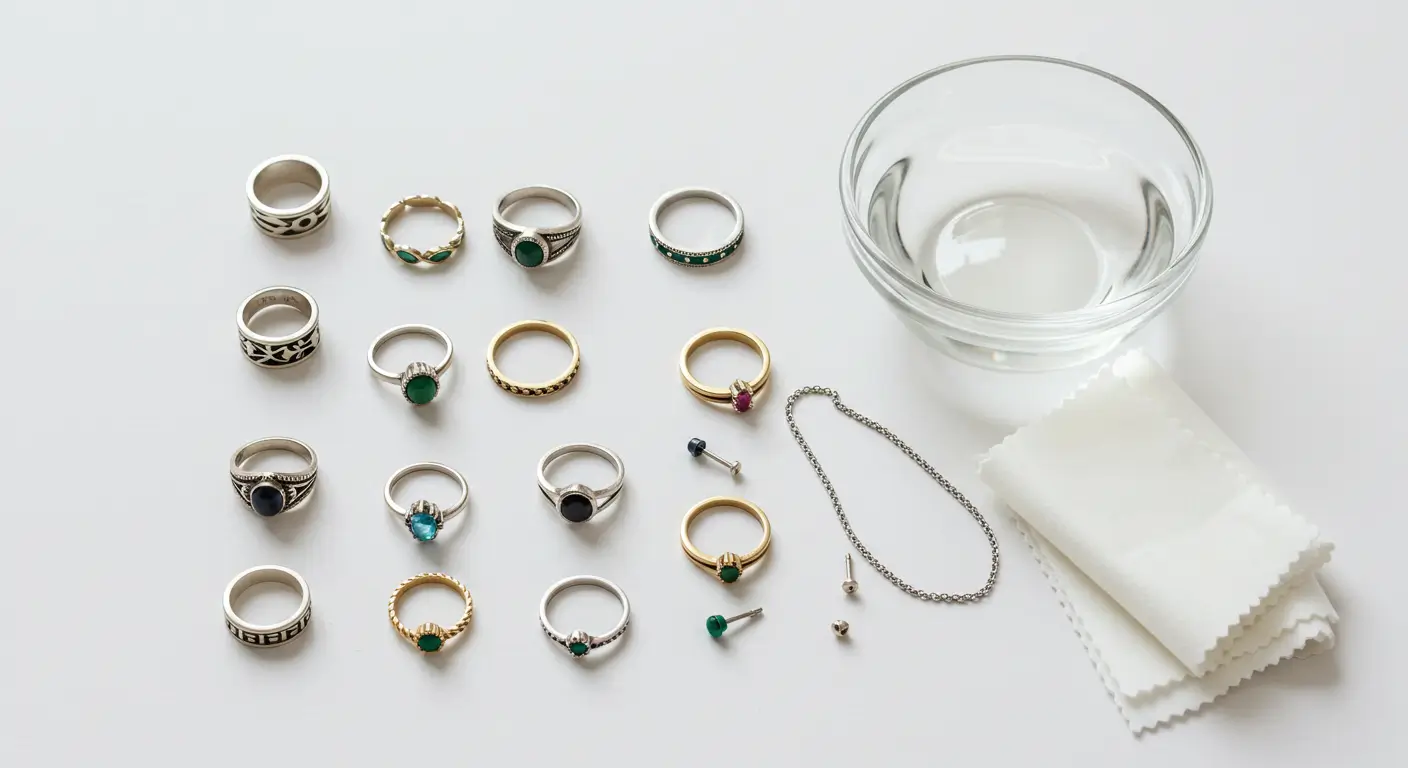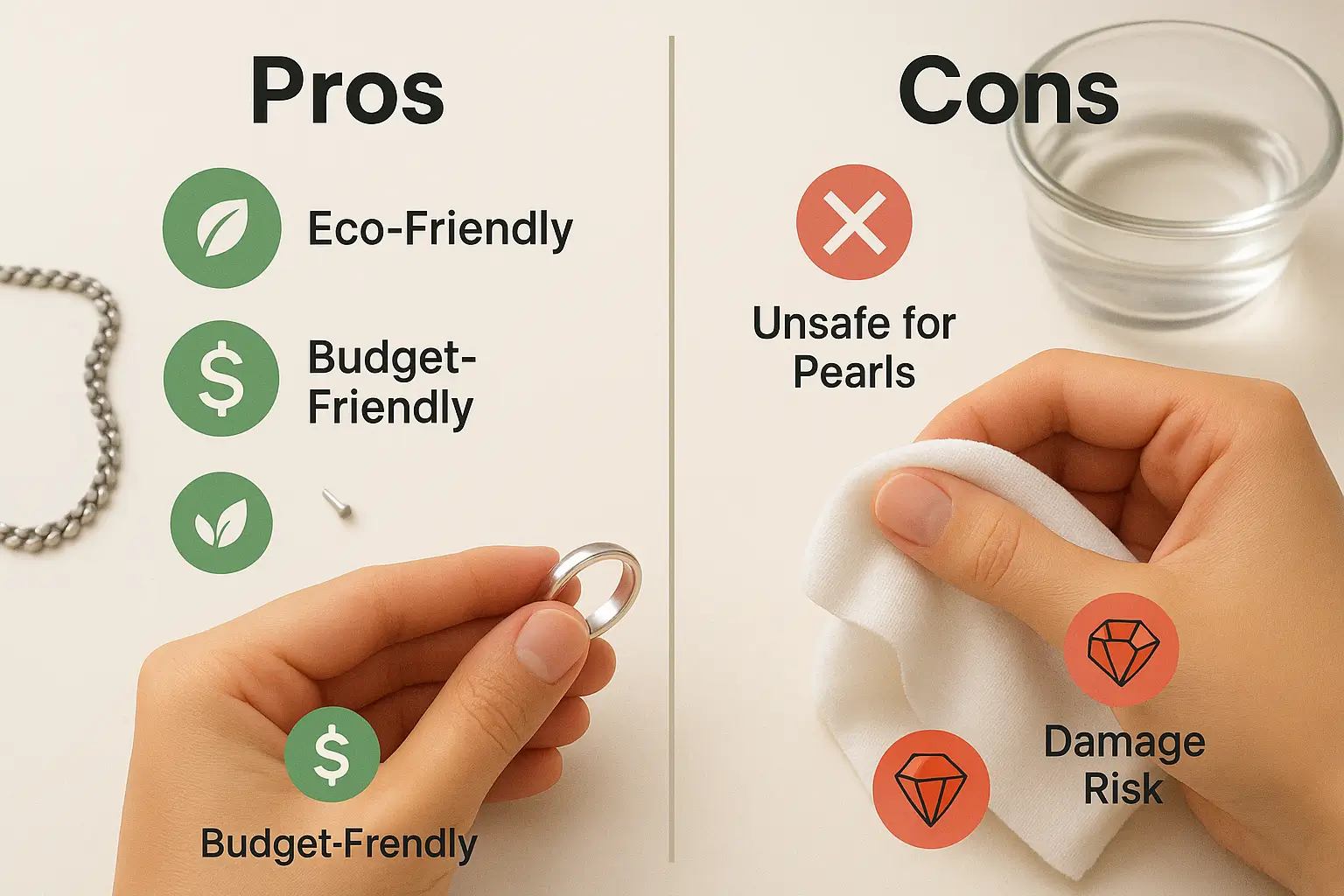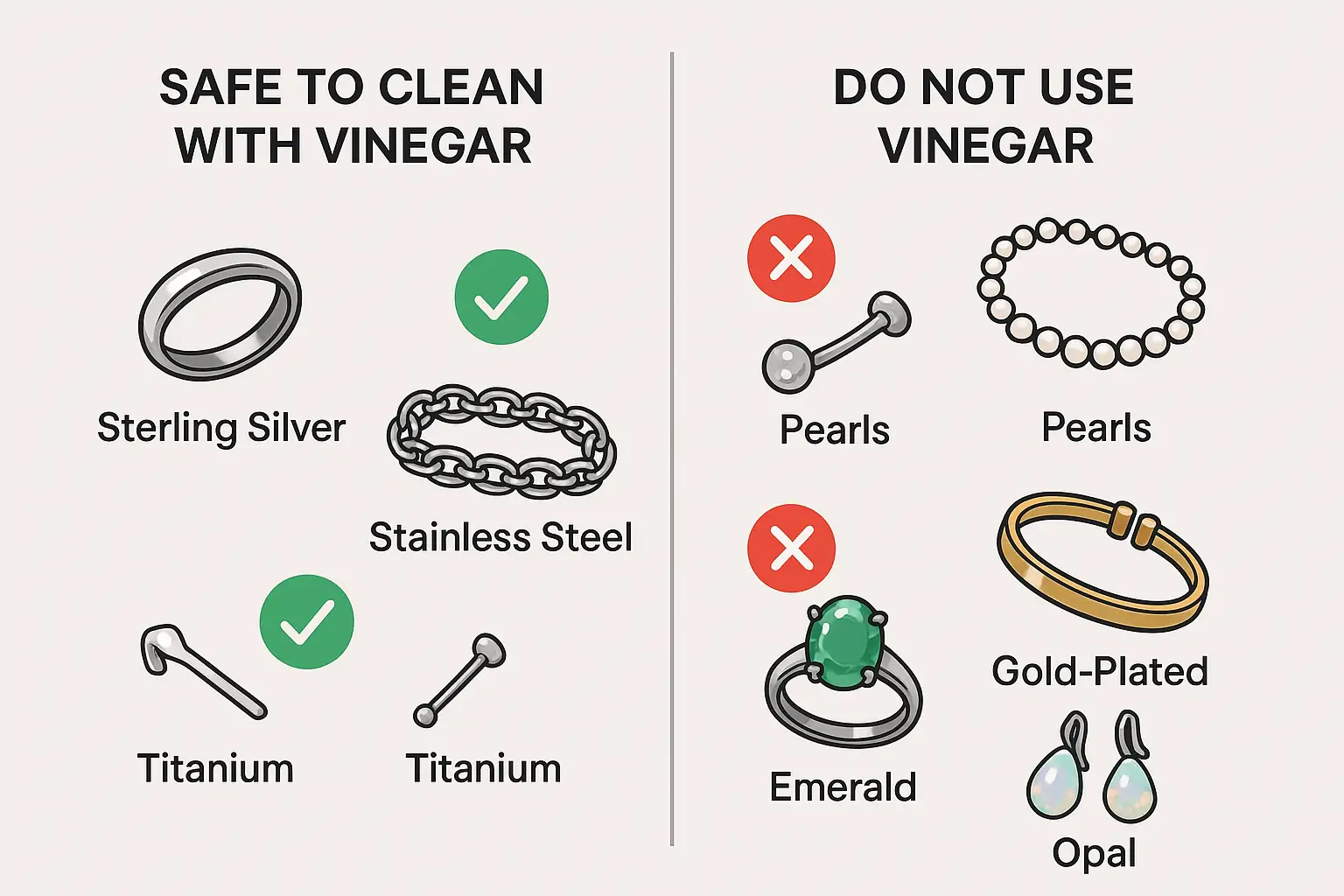Is it safe to clean jewelry with vinegar? Pros and Cons
Jewelry often loses its shine over time due to dust, oils, and sweat buildup. A common DIY method is using vinegar to clean jewelry, but is it truly safe? -- "Is it safe to clean jewelry with vinegar?"
In this guide, we'll explore the pros and cons of cleaning jewelry with vinegar, what works best, and what to avoid.

What is vinegar solution?
Vinegar is a diluted solution of acetic acid (CH₃COOH) that is made through a fermentation process. It commonly contains 4% to 8% acetic acid, and the rest is water. For this reason it is considered a natural cleaning agent. But white vinegar or distilled vinegar is suitable for jewelry cleaning.
Pros and Cons of Use Vinegar on Jewelry?
Learn the pros and cons of using vinegar to clean jewelry and whether it's safe for your metals or gemstones. Because vinegar is a natural cleaning agent, But it is important to remember that it is also an acid. This means it is not safe for every material. Below are the pros and cons of this solution.
Pros of Vinegar Solution:
1. Budget-Friendly:
Vinegar is not only a kitchen essential but also a powerful natural cleaning agent. Because this solution is low-cost, you can easily find it everywhere.
2. Eco-Friendly & Non-Toxic
When it comes to delicate things like jewelry, people want to avoid harsh chemicals. In this regard, vinegar is a great option: it produces no harmful fumes, is safe for indoor use, and is biodegradable. This is especially ideal for those who follow a sustainable lifestyle or have allergies to strong cleaners.
3. Effective on Certain Metals
Vinegar is considered a very effective cleaner for certain jewelry materials, especially for sterling silver, stainless steel, etc. It can help remove tarnish and restore shine without damaging the metal. However, it's important to rinse the jewelry thoroughly after cleaning to avoid any potential residue.
4. Great at Removing Tarnish, Oil & Grime
The acidic nature of vinegar makes it a powerful grime buster. It also dissolves skin oil & lotion buildup, cleans sweat stains, and removes dust particles and light tarnish. Making it a convenient cleaner for daily wear jewelry (such as nose studs, rings, and chains).

Cons of Vinegar Solution:
No matter how popular and effective vinegar is, everything has some limitations and side effects—especially when it comes to delicate items like jewelry. If you use vinegar without proper knowledge, your precious jewelry can also get damaged. Let's see some major risks of vinegar:
1. Acidic Nature May not be suitable for all types of jewelry materials.
Vinegar is an acidic solution (pH ≈ 2.5), which can be harmful to soft or porous gemstones like pearls, opals, emeralds, turquoise, and coral. Its acid can etch the surface, leaving the stone cloudy, scratched, or dull. So
These stones are natural and have delicate surfaces that can suffer permanent damage from exposure to vinegar.
2. Prong settings can be loose.
Sometimes vinegar reacts in the micro-gaps between metal parts, which can cause the prong or clasp to loosen. This is especially seen in delicate or vintage jewelry.
3. Not Ideal for Antique or Heirloom Jewelry
Antique jewelry or sentimental pieces contain unique metal combinations and old-style stones. Using vinegar with them can be a big risk: metal can discolor, dull, or structurally weaken.
What Type of Jewelry Can Be Safely Cleaned with Vinegar?
It's only safe to use vinegar for jewelry cleaning if you use it on the right type of jewelry material. Not every metal or gemstone tolerates vinegar acidity—and permanent damage can occur if you use it on the wrong things.
Here are some materials that are safe to use with vinegar:
- Sterling Silver,
- Hard Metals (Like Stainless Steel & Titanium)
- No-Stone Jewelry (Plain Metal Pieces)

What NOT to Clean with Vinegar
When you use vinegar for jewelry cleaning, every material needs safe handling. Vinegar is an acidic solution that can damage some materials. If you want to keep your jewelry safe and shiny, there are some items that should not come in contact with vinegar.
Here is the list of materials that should be kept away from vinegar:
- Pearls
- Opals
- Emeralds
- Turquoise
- Gold-Plated Jewelry
- Glued Jewelry
Some Popular And Effective Methods
There are some popular and effective methods of cleaning jewelry with vinegar, but not all methods are suitable for every type of jewelry. Below are the four common methods of cleaning jewelry with vinegar.
- Soaking Method (Vinegar-Only for Tarnished Silver)
- Vinegar + Baking Soda (For Heavy Tarnish)
- Vinegar + Water Diluted Solution (Gentler Version)
- Vinegar + Dish Soap (for Oil/Grime Removal)
Alternative Methods of Jewelry Cleaning (Safer Than Vinegar)
While vinegar is a popular DIY cleaner, it’s not always the safest option—especially for delicate stones or antique pieces. Here are some safe and effective alternatives you can use for every type of jewelry:
1. Mild Soap and Warm Water Solution
Best For: Everyday gold, silver, platinum, and gemstone jewelry (except porous stones).
2. Jewelry Polishing Cloth
Best for: Light tarnish on silver, gold, and platinum jewelry.
3. Ultrasonic Jewelry Cleaner (At-Home Device)
Best for: Professional-level cleaning for metal jewelry.
4. Commercial Jewelry Cleaning Solutions
Best for specific metals and stones.
FAQs
Is it safe to clean all types of jewelry with vinegar?
No, vinegar is not safe for all types of jewelry. While it works well on sterling silver and stainless steel, it can damage soft gemstones like pearls, opals, and emeralds, as well as gold-plated or antique jewelry.
What kind of jewelry can I clean with vinegar?
You can safely clean sterling silver, stainless steel, and titanium jewelry with vinegar. Make sure the pieces do not contain any soft or porous stones.
What are the risks of using vinegar to clean jewelry?
Vinegar is acidic, which means it can: etch soft gemstones, strip gold plating, loosen prong settings, and damage glued or antique jewelry.
Is white vinegar or apple cider vinegar better for jewelry cleaning?
White vinegar is preferred because it is clear, has consistent acidity, and doesn’t stain. Apple cider vinegar may leave a residue or cause discoloration, especially on lighter metals.
How long should I soak jewelry in vinegar?
If you're cleaning tarnished silver, soak it in vinegar for 5 to 15 minutes. Always rinse thoroughly and dry afterward. Never soak delicate or stone-studded pieces.
Can vinegar restore shine to silver jewelry?
Yes, vinegar can help remove tarnish and restore shine to silver jewelry when used properly—especially when combined with baking soda or aluminum foil.
What are some safer alternatives to vinegar for cleaning jewelry?
Mild soap and warm water, jewelry polishing cloths, professional jewelry cleaning solutions, and ultrasonic cleaners (for non-delicate pieces).
How do I know if my jewelry is safe to clean with vinegar?
Check the materials. If your jewelry contains soft gemstones, glue, or gold plating, avoid using vinegar. When in doubt, do a patch test or consult a professional.
Can I use vinegar to clean gold jewelry?
No, it’s best to avoid vinegar on gold or gold-plated jewelry. It can dull the finish and potentially cause long-term damage.
What’s the best way to clean silver jewelry at home?
Use a baking soda and white vinegar solution, a mild soap soak, or a silver polishing cloth for safe and effective results.
Conclusion & Final Thoughts Can we Use Vinegar Or Not
Jewelry cleaning is an important task that should be done carefully and thoughtfully, especially when delicate items are involved. Vinegar can be an effective cleaning agent, but it does require some precautions. In this article, we looked at which jewelry types are safe and which can be damaged if exposed to vinegar.
Do's:
- Sterling silver, stainless steel, and titanium jewelry can be cleaned with vinegar.
- Using mild soap and warm water is safe and effective for daily wear jewelry.
- Using jewelry cleaning cloths is safe for regular polishing.
- If unsure, check by doing a patch test.
Don'ts:
- Avoid pearls, opals, emeralds, and turquoise with vinegar, as these are soft stones that can easily be damaged.
- Do not clean gold-plated jewelry with vinegar so as not to strip the coating.
- Avoid antique or heirloom pieces with vinegar, as their condition can easily be compromised.
 Nose Ring Haven
Nose Ring Haven